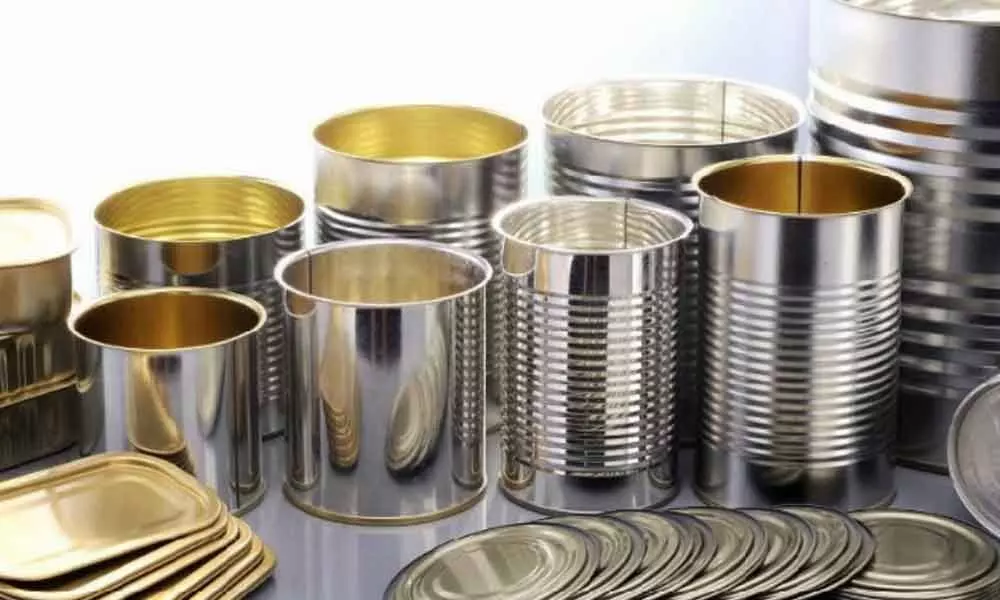BIS QCO norm a stumbling block for metal packaging industry

BIS QCO norm a stumbling block for metal packaging industry
Covid-19-induced situation creating new demand for metal packaging industry and new markets of sanitizers, disinfectants
What are the growing opportunities in metal packaging?
Owing to the rising population, increasing income levels, changing lifestyles, increased media, and the demand for packaging is growing. Besides, it is one of the strongest growing sectors in the country. The rapid growth of the market is primarily driven by the pharmaceuticals, foods and beverages, decorative paints, etc. Huge investments in these industries is creating scope for expansion of the packaging market. The end-user of such products includes food, beverage, healthcare, cosmetics, personal care, paints, household care and industrial segment. As per retail association reports, the current situation amid second phase of Covid-19 is creating further opportunities for packaging of food products, sanitizers and disinfectants in aerosol cans for longer shelf life.
Tell us about the emerging technologies in metal packaging industry?
Metal packaging industry in India is primarily concentrated in the MSME sector. The industry is located all over the country close to the filling units as the freight cost on the empty containers is quite high. The industry is focusing on several factors including new technologies in making quality cans in a cost-effective manner, continuous focus on innovation, adopting environment-friendly technologies in the can making process, promoting localization of imported components such as easy open ends and peel off ends.
How does the BIS order on tin products hit packaging industry?
The industry is facing tough time owing to the steel and steel products Quality Control Order (QCO) dated July 17, 2020, issued by the Union Steel Ministry, that imposed mandatory BIS Certification on the major inputs required by the industry like tinplate/tin free steel and also imposed restriction on various steel products like easy open ends and peel off ends, which the industry is importing from several countries.
For international suppliers of tin plates, India is a small market, so they are not interested to get into lengthy bureaucratic and cost intensive BIS certification process.
The foreign suppliers have therefore stopped shipping tin plates to India and there is already a shortage in the domestic market. Furthermore, the industry is witnessing a sharp increase in the prices of local tin plate due to virtual monopoly of the two producers. In the quarter ending December, there is an increase of about six to seven per cent in the tin plate/ tin free steel prices along with another 7 to 8 per cent increase announced from January onwards. The industry fears any increase in the prices of tinplate/tin free steel, which is almost equal to 60 per cent of the cost of a tin container/closure, will further add to the price rise. Consequently, high prices of cans may force our customers to move away from metal packaging to other alternative packaging options especially in food, beverage and paint industry.
Will metal consumption and demand pick up in the days to come? How will prices behave?
The demand can pick up if the QCO is dropped. For example, a similar notification imposing mandatory BIS standards was brought earlier in the 2008, 2015 and 2017. However, after considering representation from trade and industry and keeping in mind practical issues in implementation, the said notifications were withdrawn. Also, the local producers had filed applications with Directorate General of Trade Remedies (DGTR) for imposition of Anti-Dumping duty on import of tinplate, which was favourably considered by DGTR in June, 2020. The DGTR recommended levying Anti-Dumping duty ranging from Rs15,000 to Rs 25,000 per tonne for import of tinplate/ tin free steel from select countries. The Finance Ministry favourably considered representation of MCMA and decided to drop such recommendation; hence no Anti-Dumping duty was imposed.
What is the government's roadmap for boosting domestic metal demand?
Well, the industry has put forth a set of recommendations to the ministry over the concern of BIS certifications and hoping for a positive response from the policy makers since the industry is providing packaging material and packaging solutions in the form of tin container and component closures to food, beverages and other household industry. By withdrawing the mandatory certification, the foreign suppliers will restart shipping tin plates to India as at present there is a huge shortage in the domestic market.
Apart from BIS norms, how Covid has impacted the metal industry?
Covid-19 has impacted the industry both positively and negatively. The industry lost production for almost 40-45 days,although packaging materials were included in the essential commodity. The industry also lost the business of various food products, which were canned in the tin container to be consumed by the hotels, restaurants, and catering industry (HORECA segment). As already mentioned, certain new markets have been opened for metal packaging for products such as sanitizers and disinfectants. Certain products shifted from alternate packaging material to tin cans considering its superior quality in providing longer shelf life to the products.
What percentage of MSMEs are involved in metal packaging industry and as of now, there are only two companies that have been granted the BIS certification. So, this is going to increase monopoly. What is your view on this?
Well, the industry is witnessing a sharp increase in the prices of tin plates due to virtual monopoly of the two producers. In the quarter ending December, there is an increase of about 6 to 7 per cent in the tin plates/ tin-free steel prices along with another 7 to 8 per cent increase announced from January.
BIS implementation is not only on metal, it is also on import of various other products such as plastic, processed industry, auto wheel rims and many other products, then why metal industry is against this decision? If demand is for extension, then how much extension is going to help the industry?
The resistance of the metal packaging industry against imposition of BIS is due to following reasons: There is a demand-supply gap, i.e. the industry needs about 7 lakh tonnes of material, while the domestic production is about 4.50 lakh tonnes. Keeping in mind, the demand and growth of about five per cent, the industry meets its requirement from imports and with the kind of investment, it has done and employment it provides, industry's requirement of material has to be met. Industry imports both prime and non-prime materials for manufacture of tin containers/various products for food and non-food segments. The industry can use non-prime material for manufacture of tin containers for non-edible products such as paints and chemicals and various other products like stationery items. Non-prime material arises as a by-product when the prime material is produced by the tinplate mills and is categorised as non-prime due to thickness variation and surface defect.

















